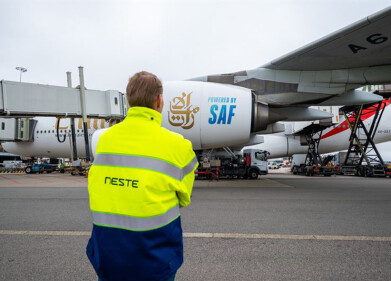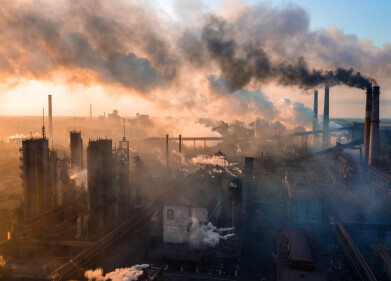Fuel for Thought
DEFRA Hosts Emergency Meeting on Synthetic Fertiliser Prices
May 19 2022
As the coronavirus ran rampant across the planet in the early months of 2020, most of us found ourselves, unsurprisingly, scrambling around in fear and confusion. But one of the strangest aspects of daily experience in these opening stages of the pandemic was that, for the first time, people in Britain had a tangible sense of their place in an interconnected global system, a visceral understanding that their own individual behaviour could have ramifications a world away – and vice versa. It was, for many, a surprising sensation, and it must have prompted a lot of soul-searching. Of course, as the pandemic ebbed, it would have been easy to lose touch with this realisation. That is, if history hadn’t conspired against our blissful ignorance.
Now entering its third month, the Russian invasion of the Ukraine has pulled popular focus towards the frictional co-dependency of Europe’s economies – in particular, commentators have raised the alarm over the long-term role of natural gas in Russia-Ukraine tensions and the conflict’s unforeseen consequences for the energy security of the continent. But gas, unfortunately, is only one of the essential commodities caught up in the chaos – and it is by far the least troubling for the British economy.
By virtue of the massive oil reserves underneath Siberia, the Russian Federation is the world’s predominant exporter of synthetic fertiliser. And as the invasion of Ukraine proceeded, Putin’s administration took to restricting exports. With omni-present whisperings of trade embargoes, nervous insurance companies refused to ensure what few cargo-ships kept their routes to Black Sea, further reducing the traffic. As this bottleneck continued to contract, prices moved rapidly skyward.
In the United Kingdom, prices for liquid urea ammonium nitrate – of which Russian manufacturers are the leading suppliers – breached £1,000 in March, an increase of nearly 400%. Once again, Britons can feel their dependence on far-off economies. This time, as food prices climb, they can feel it in their stomachs.
DEF(RA)CON 1
As the shockwaves of the fertiliser crisis reached Westminster, the Department for Environment, Food and Rural Affairs (DEFRA) called a series of emergency talks to establish a response. Attending these meetings were various representatives of the agricultural industry, delegates from organisations like the National Farmers Union, the Agriculture and Horticulture Development Board, the Country Land and Business Association, and the Tenant Farmers Association.
President of the Country Land and Business Association, Mark Tufnell, encapsulated the mood:
“Some farmers may choose not to spread fertiliser at all this year. But if prices continue to stay at this all-time high then government will need to urgently consider ways of increasing and diversifying domestic fertiliser production. We hope this will be a central focus of the roundtable DEFRA has called.”
One of DEFRA’s touted solutions is legal, and requires strengthened coordination with the Environment Agency. The Department aims to improve the clarity of statutes to better advise British farmers on the use of slurry and other manures.
Another idea is to delay a ban on urea, which was due to be introduced in the coming months as part of attempts to tackle ammonia pollution. Now, not only is the ban delayed, but when similar measures are introduced, they will only apply to the use of ammonia as an inhibitor of anaerobic digestion in urea.
Further support will come from the new Sustainable Farming Incentive. As part of the scheme, plants like blue wild indigo, Cherokee bean and fennel will be made available to British farmers at a discount, all of which naturally convert organic nitrogen (N2) in the air into the ammonia (NH3) needed for biosynthesis. And so will non-synthetic fertilisers, like Epsom salt, fishmeal and bloodmeal.
Announcing these measures, George Eustice, the Secretary of the Department for Environment, Food and Rural Affairs, remarked that this was “not the whole solution” to the fertiliser crisis and that the Department would continue to help farmers “manage their nitrogen needs in the year ahead” as the situation developed.
But the Secretary considers this to be far more than a temporary stressor:
“The significant rise in the cost of fertiliser is a reminder that we need to reduce our dependence on manufacturing processes dependent on gas,” he mused. “Many of the challenges we face in agriculture will require a fusion of recent technology with conventional principles of good farm husbandry.”
For a flavour of the new perspectives on ammonia monitoring shaping the future of the agricultural industry, follow the link to reveal a research paper on the topic.
Digital Edition
PIN 25.1 Feb/March
March 2024
In This Edition Safety - The technology behind the ION Science Tiger XT - Safety with ammonia and LOHCs as hydrogen carriers Analytical Instrumentation - Discussion on new tribology te...
View all digital editions
Events
Apr 22 2024 Hannover, Germany
Apr 22 2024 Marrakech, Morroco
Apr 22 2024 Muscat, Oman
Apr 22 2024 Rotterdam, Netherlands
Apr 23 2024 Singapore


















